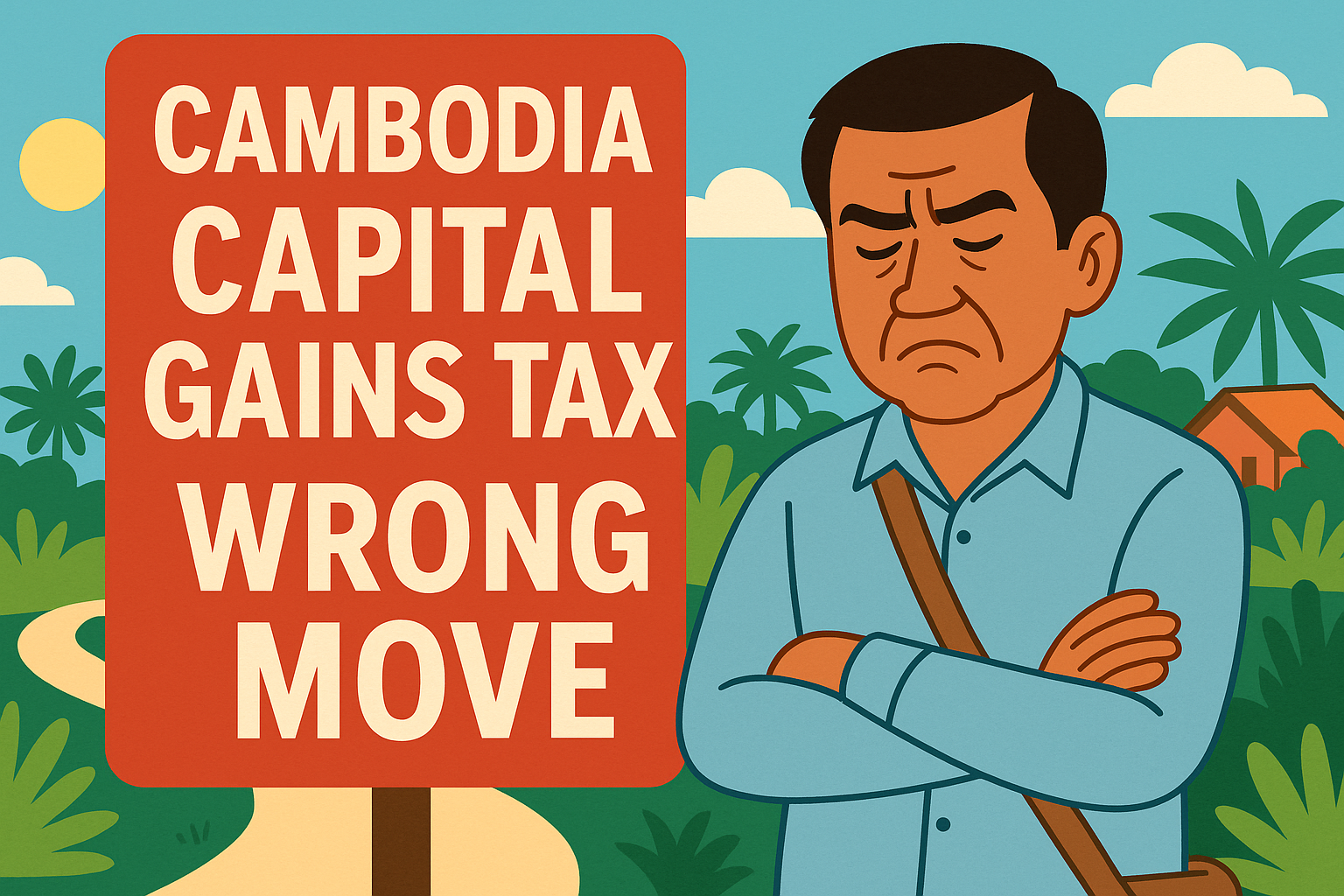Cambodia's Capital Gains Tax: Why Now Isn't the Right Time
Cambodia is preparing to introduce a 20% Capital Gains Tax (CGT) starting September 1, 2025, covering profits from shares, leases, goodwill, intellectual property, and foreign exchange. Real estate transactions will follow suit on January 1, 2026, according to Prakas 496.
While policymakers claim this move will "align Cambodia with international norms," the timing and design of this tax raise serious concerns for businesses, investors, and ordinary Cambodians. Here's why this policy may do more harm than good.
The Tax System Is Already Too Complex
Cambodia relies heavily on indirect taxes, which are already creating significant burdens:
- Value-added tax (VAT) accounts for nearly one-third (31.9%) of all tax receipts
- Excise taxes add another 20.9% to the mix
- Even after years of modernization, VAT still represents roughly 28% of domestic revenue
Adding a CGT means introducing entirely new layers of complexity: fresh filing forms, asset valuation rules, and exemption tests. This will create massive compliance headaches for taxpayers while stretching an administration that's already managing multiple tax regimes.
Revenue Is Declining, Not Growing
The government's own numbers tell a concerning story:
- Tax revenue dropped from 18% of GDP before the pandemic to just 13% in 2023
- Indirect tax yields are falling as consumer spending slows and free-trade agreements reduce tariffs
- Direct taxes are being squeezed by generous tax holidays under the new Investment Law
AMRO analysts point to these investment incentives, rather than economic weakness, as a key factor in the 2023 revenue shortfall. In this context, a CGT is unlikely to generate significant revenue, but it will certainly increase administrative costs and complicate life for honest taxpayers.
Foreign Investment Is Still Recovering
Foreign direct investment (FDI) remains fragile:
- Approved FDI-financed projects reached just US$455 million in Q1 2024
- While this represents an improvement from 2023, it's still roughly half of what Cambodia saw in Q1 2019
- Boardrooms are already reconsidering their Cambodia strategies
Introducing a headline-grabbing CGT at this delicate moment risks sending the wrong message about fiscal stability and the overall cost of doing business in Cambodia.
The Property Market Needs Support, Not More Taxes
Cambodia's construction and real estate sectors are struggling:
- Approved property project permits totaled barely US$340 million in Q1 2024—well below pre-COVID peaks
- Real estate activities shrank by almost 13% in 2023
- The sector remains in a prolonged slump
Most domestic property buyers rely on capital appreciation rather than rental income for returns. Introducing a CGT on real estate in 2026 could deepen and extend this downturn, precisely when the market needs encouragement to recover.
Fairness Issues Will Undermine Public Trust
Cambodia's current tax system is already problematic:
- Heavy reliance on indirect taxes makes the system regressive, hitting lower-income households hardest
- Widespread investment incentives and sectoral exemptions create loopholes and erode the tax base
- The IMF notes that tax holidays and ad-hoc exemptions "exacerbate the already limited tax revenue" while adding administrative complexity
Unless the CGT is enforced equally on well-connected entities, perceptions of unfair treatment will grow—and so will tax evasion.
There Are Better Alternatives
International experience shows that governments can boost revenue more effectively by:
Strengthening existing systems: Tighten VAT exemptions and improve e-commerce tax collection to broaden the current tax base.
Eliminating revenue leaks: Phase out discretionary incentives that drain government coffers without delivering proportional investment benefits.
Modernizing income taxation: Introduce a comprehensive personal income tax system to better balance the burden between labor and consumption, as recommended by both the World Bank and IMF.
The Bottom Line
Cambodia faces a challenging combination of factors that make this an inappropriate time for a CGT:
- VAT already dominates the tax system
- Tax-to-GDP ratios are falling
- Foreign investment remains below pre-pandemic levels
- The property sector is under severe pressure
A phased CGT might look good on international comparison charts, but in practice, it risks deterring investment, further depressing an already fragile real estate market, and widening public perceptions of tax unfairness.
The recommendation is clear: Policymakers should pause this implementation, focus on fixing the existing system's problems, and only return to CGT discussions when administrative capacity is stronger and investor confidence has fully recovered.
